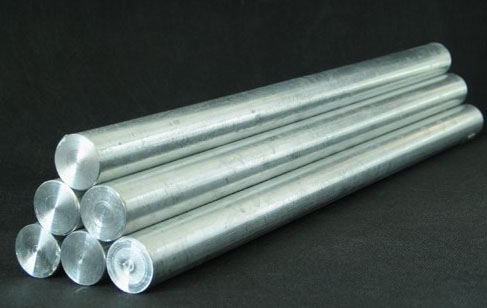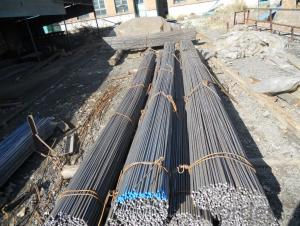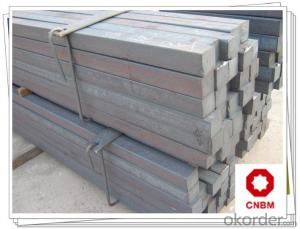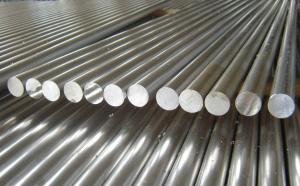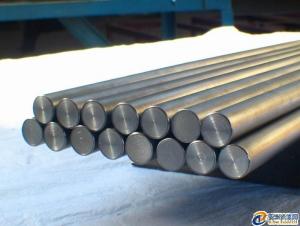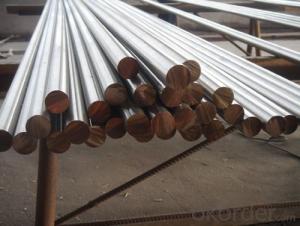Round Bar Hot Rolled High Quality Q195 Q235 8MM-22MM
- Loading Port:
- China Main Port
- Payment Terms:
- TT or LC
- Min Order Qty:
- -
- Supply Capability:
- -
OKorder Service Pledge
OKorder Financial Service
You Might Also Like
Product Description:
OKorder is offering Round Bar Hot Rolled High Quality Q195 Q235 8MM-22MM at great prices with worldwide shipping. Our supplier is a world-class manufacturer of steel, with our products utilized the world over. OKorder annually supplies products to European, North American and Asian markets. We provide quotations within 24 hours of receiving an inquiry and guarantee competitive prices.
Product Applications:
1) Suitable for making various strong cutting tool abrasion resistance, impact resistance.
2) Used to produce all kinds of high hard and super hard saw blade, drill, tap, broach, gear hob and various kinds of milling cutter.
3) Used for advanced punching die, screw die, and the toughness and complicated shape of the punch, etc.
4) Is used for cold forging die and drawing mode, etc.
5) Recommended watchcase factory, screw factory and other cold stamping products industry use.
Product Advantages:
OKorder's Round Bar Hot Rolled High Quality Q195 Q235 8MM-22MM are durable, strong, and resist corrosion.
Main Product Features:
· Premium quality
· Prompt delivery & seaworthy packing (30 days after receiving deposit)
· Corrosion resistance
· Can be recycled and reused
· Mill test certification
· Professional Service
· Competitive pricing
Product Specifications:
1. Grade: GB, JIS, ASTM, EN
2. Grade: Q235, SS400, A36, S235JR
3. Diameter and mass: As below
Diameter | Mass | Diameter | Mass | Diameter | Mass |
(mm) | (kg/m) | (mm) | (kg/m) | (mm) | (kg/m) |
6 | 0.22 | 22 | 2.98 | 53 | 17.30 |
7 | 0.30 | 24 | 3.55 | 56 | 19.30 |
8 | 0.40 | 25 | 3.85 | 60 | 22.20 |
9 | 0.50 | 26 | 4.17 | 63 | 24.50 |
10 | 0.62 | 28 | 4.83 | 65 | 26.00 |
11 | 0.75 | 30 | 5.55 | 70 | 30.20 |
12 | 0.89 | 32 | 6.31 | 75 | 34.70 |
13 | 1.04 | 34 | 7.13 | 80 | 39.50 |
14 | 1.21 | 36 | 7.99 | 85 | 44.50 |
15 | 1.39 | 38 | 8.90 | 90 | 49.90 |
16 | 1.58 | 40 | 9.86 | 95 | 55.60 |
17 | 1.78 | 42 | 10.90 | 100 | 61.70 |
18 | 2.00 | 45 | 12.50 | 120 | 88.85 |
19 | 2.23 | 48 | 14.20 | 140 | 120.93 |
20 | 2.47 | 50 | 15.40 | 150 | 138.82 |
4. Material: Mild Steel
5. Heat treatment of high quality steel:
Fire: Isothermal annealing temperature is 800 ~ 880 °C, with 10 ~ 20 °C, the furnace cooling to about 600 °C, hardness above HB269.
Preheat temperature: 730-730 °C
Quenching temperature: 1190-1210 °C
Tempering temperature: 540-595 °C
Cold drawn, hardness 285 HBS
Cold drawn after annealing condition, hardness 277 HBS
Quenching methods: oil quenching, air cooling or salt bath quenching
FAQ:
Q1: Why buy Materials & Equipment from OKorder.com?
A1: All products offered byOKorder.com are carefully selected from China's most reliable manufacturing enterprises. Through its ISO certifications, OKorder.com adheres to the highest standards and a commitment to supply chain safety and customer satisfaction.
Q2: How do you package the angle steel when shipping?
A2: All goods are packed in bundles with steel strips and shipped by container or break bulk.
Q3: The products are invoicing on theoritical weight or on actual weight?
A3: We can do it in both manners, according to the customers' request.
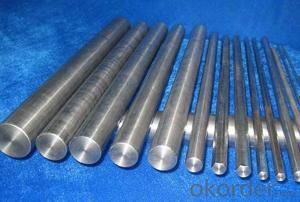
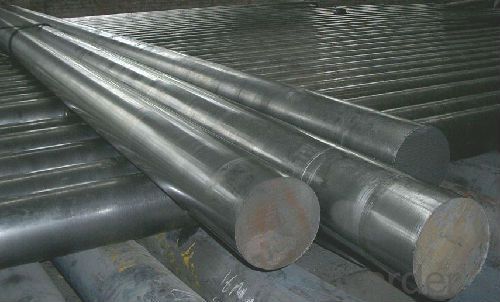
- Q: What are the weight calculations for steel round bars?
- The weight calculations for steel round bars depend on the diameter and length of the bar. The formula used to calculate the weight is weight = volume × density, where volume = π × (diameter/2)² × length and density = 7.85 g/cm³.
- Q: Can steel round bars be used in the manufacturing of pressure vessels?
- Yes, steel round bars can be used in the manufacturing of pressure vessels. Steel round bars offer high strength and durability, making them suitable for withstanding the high pressure environment inside pressure vessels. Additionally, steel round bars can be easily fabricated and welded, allowing for the construction of complex pressure vessel designs.
- Q: What is the difference between a forged and a peeled steel round bar?
- Both forged steel round bars and peeled steel round bars are utilized in various industries for different purposes. However, there exist notable distinctions between the two concerning their manufacturing procedures and physical attributes. To produce a forged steel round bar, a solid steel billet is heated to a high temperature and then shaped into the desired form by applying pressure. This process involves the use of machinery, such as hammers or presses, to shape the steel and create the round bar. The forging process enhances the strength and durability of the steel, making it suitable for applications that demand high strength and resistance to wear and tear. In contrast, a peeled steel round bar is manufactured using a different process called peeling or turning. During this procedure, a solid steel bar is rotated against a cutting tool, which eliminates the outer layer of the bar, resulting in a smooth and precise surface finish. Peeling eliminates any surface defects or imperfections present in the original bar, thereby enhancing its dimensional accuracy and surface quality. Regarding physical characteristics, forged steel round bars typically possess a rougher surface texture due to the nature of the forging process. This rough texture can provide improved grip or adhesion in certain applications. Additionally, forged bars often exhibit a denser and more uniform internal grain structure, contributing to their superior mechanical properties. On the other hand, peeled steel round bars exhibit a smooth and shiny surface finish as a consequence of the peeling process. This smooth surface makes peeled bars suitable for applications that prioritize aesthetic appeal or require a low coefficient of friction. However, the peeling process may result in a minor reduction in the overall diameter of the bar. In conclusion, the primary distinction between a forged and a peeled steel round bar lies in their manufacturing processes and resulting physical attributes. Forged bars are created through the application of pressure, resulting in a rougher surface texture and superior mechanical properties. Peeled bars, on the other hand, are produced by removing the outer layer of a steel bar, resulting in a smooth surface finish and improved dimensional accuracy. Ultimately, the choice between these two types of bars depends on the specific requirements of the application at hand.
- Q: Can steel round bars be used for making handrails?
- Yes, steel round bars can be commonly used for making handrails due to their durability and strength.
- Q: What is the difference between hot rolled and cold rolled steel round bars?
- The main difference between hot rolled and cold rolled steel round bars lies in the process of production. Hot rolled steel round bars are formed by heating the steel above its recrystallization temperature and then rolling it into the desired shape. This process makes the steel more malleable and ductile, resulting in a rougher surface finish. On the other hand, cold rolled steel round bars are formed by rolling the steel at room temperature. This process produces a smoother surface finish and tighter dimensional tolerances, but it also makes the steel less malleable. Overall, the choice between hot rolled and cold rolled steel round bars depends on the specific application and desired characteristics of the end product.
- Q: What is the hardness of a steel round bar?
- The hardness of a steel round bar can vary depending on the specific type of steel used and the manufacturing process, but it is typically measured on the Rockwell or Brinell hardness scales.
- Q: How are steel round bars tested for quality?
- Steel round bars are tested for quality through various methods to ensure that they meet the required standards and specifications. One common test is the visual inspection, which involves examining the bars for any visible defects such as surface cracks, pits, or deformities. This is done by highly skilled personnel who are trained to identify any irregularities that may affect the quality of the steel bars. Another important test is the dimensional inspection, which measures the diameter, length, and straightness of the round bars. This ensures that the bars are within the specified tolerances and that they meet the required dimensions for their intended use. Mechanical testing is also conducted to assess the strength and mechanical properties of the steel bars. This includes tests like tensile strength, yield strength, and elongation, which determine how the bars will perform under various loads and conditions. These tests are carried out using specialized equipment and provide valuable information about the structural integrity and quality of the steel bars. Furthermore, chemical composition analysis is performed to verify that the steel bars contain the correct proportions of different elements such as carbon, manganese, and alloying elements. This analysis is crucial as it determines the suitability of the bars for specific applications and ensures that they possess the desired characteristics. In addition to these tests, non-destructive testing methods such as ultrasonic testing, magnetic particle inspection, or dye penetrant testing may also be employed. These techniques can detect internal or surface defects that may not be visible to the naked eye and provide further assurance of the quality and integrity of the steel bars. Overall, a combination of visual inspection, dimensional inspection, mechanical testing, chemical composition analysis, and non-destructive testing methods is used to thoroughly assess the quality of steel round bars. These rigorous testing processes help to ensure that the bars meet the required standards and specifications, providing customers with high-quality and reliable steel products.
- Q: What are the advantages of using nickel-molybdenum-chromium alloy steel round bars?
- The advantages of using nickel-molybdenum-chromium alloy steel round bars include excellent corrosion resistance, high strength and toughness, good weldability, and the ability to withstand extreme temperatures and pressures. These properties make the alloy steel round bars suitable for various applications in industries such as oil and gas, aerospace, and chemical processing, where durability and reliability are essential.
- Q: How are steel round bars used in the construction of transmission towers?
- Transmission towers commonly use steel round bars due to their strength, durability, and ease of fabrication. These bars, typically made from high-strength carbon steel, come in various diameters to meet different structural needs. In transmission tower construction, steel round bars serve as the primary structural elements. They form the vertical and diagonal members that provide strength and stability to the tower. The bars are connected using welding or bolted connections to create the lattice structure of the tower. The round shape of the bars allows for even distribution of forces, making them ideal for handling the loads and stresses experienced by transmission towers. These loads include the tower's weight, electrical conductors, and environmental factors like wind, ice, and seismic forces. Moreover, steel round bars offer excellent corrosion resistance, which is crucial for transmission towers exposed to harsh weather conditions. This resistance helps extend the tower's lifespan and ensures the safety and reliability of the transmission lines. Additionally, steel round bars can be easily fabricated and customized to meet the specific design requirements of the transmission tower. They can be cut, bent, and shaped to the desired dimensions, providing flexibility in tower design and construction. In conclusion, steel round bars play a crucial role in the construction of transmission towers by providing strength, durability, and corrosion resistance. Their versatility and ability to withstand various loads make them an essential component in ensuring the safe and reliable transmission of electricity.
- Q: What is the maximum temperature a steel round bar can withstand?
- The maximum temperature that a steel round bar can withstand depends on the specific grade and composition of the steel. Generally, most steel alloys can withstand temperatures up to around 1200°C (2200°F) before experiencing significant structural changes or loss of strength. However, it is always recommended to consult the manufacturer's specifications or engineering data for the specific steel alloy in question to determine its maximum temperature tolerance.
Send your message to us
Round Bar Hot Rolled High Quality Q195 Q235 8MM-22MM
- Loading Port:
- China Main Port
- Payment Terms:
- TT or LC
- Min Order Qty:
- -
- Supply Capability:
- -
OKorder Service Pledge
OKorder Financial Service
Similar products
Hot products
Hot Searches
Related keywords



